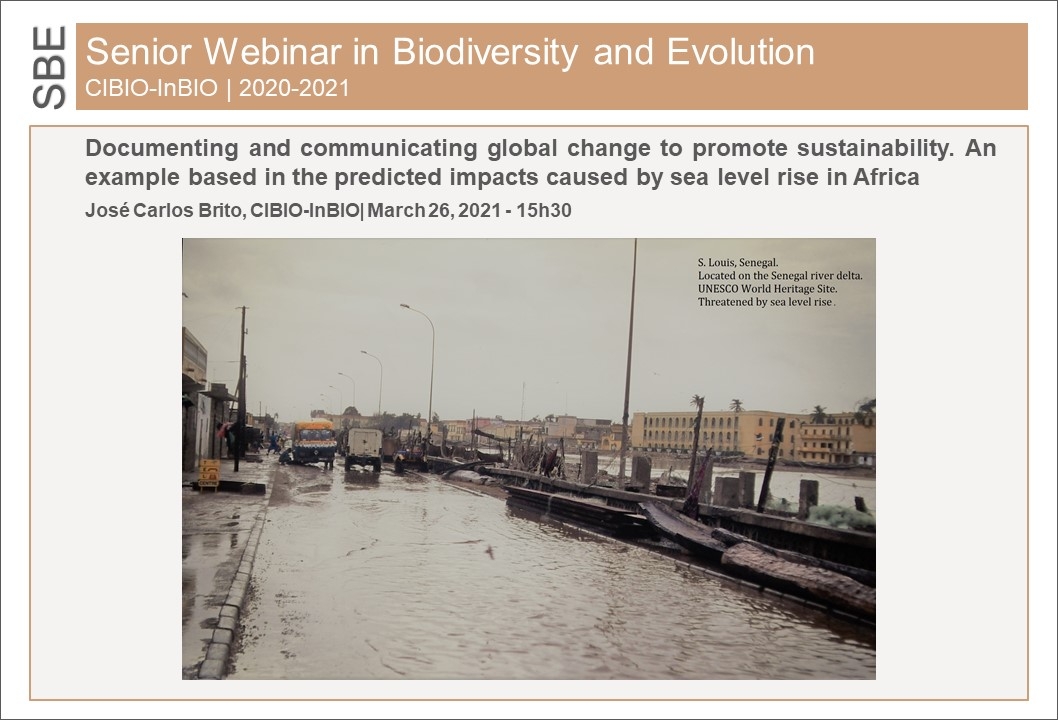Documenting and communicating global change to promote sustainability. An example based in the predicted impacts caused by sea level rise in Africa
26 Mar 2021 - José Carlos Brito, CIBIO-InBIO |15h30

SENIOR WEBINAR IN BIODIVERSITY AND EVOLUTION
Global Change, a consequence of human activities, is radically modifying the face of the Earth, with reported increase in extinction rates and decreases in species survival rates. Protected Areas assume the critical role as last strongholds for biodiversity safeguarding, but they are insufficient to ensure the effective protection of ecosystems services. Given that the current pressure over natural resources will continue increasing in the following decades, there is increased risk of disrupting the capacity for the biosphere and human civilisation to coexist. To this matter, the 17 Sustainable Development Goals set by the United Nations constitute a blueprint to achieve a more sustainable future for all that require serious commitment from all societal levels to create the bases for modifying actions and behaviours originally linked with global change impacts. In Africa, the hazardous combination between accelerated human population growth, extreme vulnerability to climate change, high exposure of coastal zones to sea-level rise, and a myriad of other pressures causing land degradation and loss of biological resources, create alarming conditions for additional pressure exerted on natural ecosystems and massive biodiversity erosion. The telecoupling character of the Anthropocene implies a broad range of socioeconomic and environmental interactions over distance that, although intimately connect coupled human and natural systems around the world, create a mental decoupling of the cause-effect relation of global change impacts, resulting in biased perceptions about the global status of biodiversity, enduring misconceptions about climate change, or even apathy towards global change impacts. We need urgently to engrain a culture of environmental responsibility and to foster environmental awareness to drive societal change, i.e., we need better informed societies that are ready to meet the challenges of long-term sustainability and the coexistence and cherishing of the planet with all its current life forms.
Completed the PhD in 2003 by the University of Lisbon. Researcher at CIBIO/InBIO since June 2003. PI of Biodeserts research group since 2011. Research interests have focused on the conservation of biodiversity from deserts and arid regions and recently has developed interests in the areas of sustainability and global change. Track record includes nearly 250 scientific and science dissemination publications, teaching GIS and Biogeography modules of MSc/PhD programmes of the Science Faculty of Porto, concluded supervision of 15 PhD and 26 MSc students, supply of framework data on biodiversity status/trends in drylands, successful guidance of 37 scientific expeditions to the Sahara-Sahel since 2000, totalling over 250,000km and 1,000 workdays exploring remote and mostly unstudied areas, collaboration and technology transfer with Universities from all continents, Ministries of Environment, and Protected Areas, position of trust as Editor of Amphibia-Reptilia journal, Associate Editor of Diversity and Distributions, and as member of the Science & Conservation Committee of Sahara Conservation Fund, and extended out-reach activities about desert biodiversity, including TV documentaries and interviews, conferences, webpage, and social media channels (Facebook, YouTube, Twitter).
[Host: Miguel A. Carretero, Functional Biodiversity - FBIO]
Click here to watch the webinar recording
Click here to watch the webinar recording